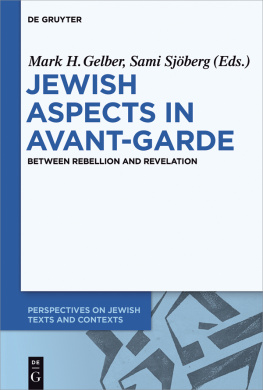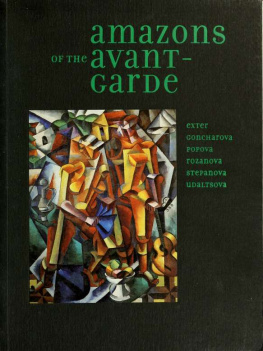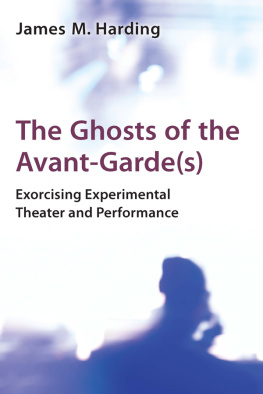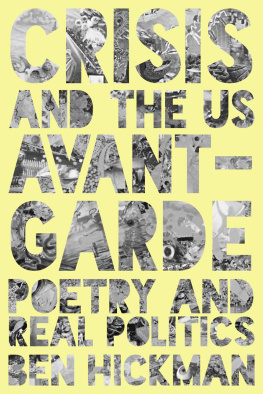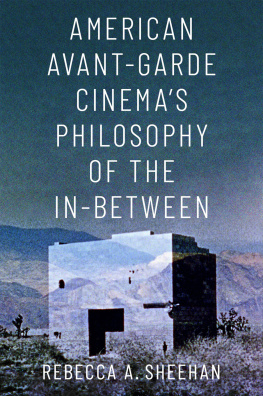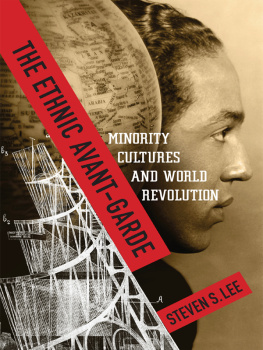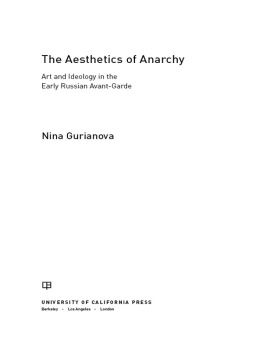Z. S. Strother - Vladimir Markov and Russian Primitivism: A Charter for the Avant-Garde
Here you can read online Z. S. Strother - Vladimir Markov and Russian Primitivism: A Charter for the Avant-Garde full text of the book (entire story) in english for free. Download pdf and epub, get meaning, cover and reviews about this ebook. year: 2015, publisher: Ashgate Publishing, genre: Non-fiction. Description of the work, (preface) as well as reviews are available. Best literature library LitArk.com created for fans of good reading and offers a wide selection of genres:
Romance novel
Science fiction
Adventure
Detective
Science
History
Home and family
Prose
Art
Politics
Computer
Non-fiction
Religion
Business
Children
Humor
Choose a favorite category and find really read worthwhile books. Enjoy immersion in the world of imagination, feel the emotions of the characters or learn something new for yourself, make an fascinating discovery.

- Book:Vladimir Markov and Russian Primitivism: A Charter for the Avant-Garde
- Author:
- Publisher:Ashgate Publishing
- Genre:
- Year:2015
- Rating:4 / 5
- Favourites:Add to favourites
- Your mark:
- 80
- 1
- 2
- 3
- 4
- 5
Vladimir Markov and Russian Primitivism: A Charter for the Avant-Garde: summary, description and annotation
We offer to read an annotation, description, summary or preface (depends on what the author of the book "Vladimir Markov and Russian Primitivism: A Charter for the Avant-Garde" wrote himself). If you haven't found the necessary information about the book — write in the comments, we will try to find it.
Z. S. Strother: author's other books
Who wrote Vladimir Markov and Russian Primitivism: A Charter for the Avant-Garde? Find out the surname, the name of the author of the book and a list of all author's works by series.
Vladimir Markov and Russian Primitivism: A Charter for the Avant-Garde — read online for free the complete book (whole text) full work
Below is the text of the book, divided by pages. System saving the place of the last page read, allows you to conveniently read the book "Vladimir Markov and Russian Primitivism: A Charter for the Avant-Garde" online for free, without having to search again every time where you left off. Put a bookmark, and you can go to the page where you finished reading at any time.
Font size:
Interval:
Bookmark:
VLADIMIR MARKOV AND RUSSIAN PRIMITIVISM
Hailed as a brilliant theoretician, Voldemrs Matvejs (best known by his pen name Vladimir Markov) was a Latvian artist who spearheaded the Union of Youth, a dynamic group championing artistic change in Russia, 191014. His work had a formative impact on Malevich, Tatlin, and the Constructivists before it was censored during the era of Soviet realism.
This volume introduces Markov as an innovative and pioneering art photographer and assembles, for the first time, five of his most important essays. The translations of these hard-to-find texts are fresh, unabridged, and authentically poetic. Critical essays by Jeremy Howard and Irna Buinska situate his work in the larger phenomenon of Russian primitivism, i.e. the search for the primal. This book challenges hardening narratives of primitivism by reexamining the enthusiasm for world art in the early modern period from the perspective of Russia rather than Western Europe. Markov composed what may be the first book on African art and Z.S. Strother analyzes both the text and its photographs for their unique interpretation of West and Central African sculpture as a Kantian play of masses and weights. The book will appeal to students of modernism, orientalism, primitivism, historiography, African art, and the history of the photography of sculpture.
Jeremy Howard is Senior Lecturer, School of Art History, University of St Andrews, UK
Irna Buinska is Curator, Latvian National Museum of Art, Latvia
Z.S. Strother is Riggio Professor of African Art, Columbia University, USA
STUDIES IN ART HISTORIOGRAPHY
Series Editor: Richard Woodfield,
University of Birmingham, UK
The aim of this series is to support and promote the study of the history and practice of art historical writing focusing on its institutional and conceptual foundations, from the past to the present day in all areas and all periods. Besides addressing the major innovators of the past it also encourages re-thinking ways in which the subject may be written in the future. It ignores the disciplinary boundaries imposed by the Anglophone expression art history and allows and encourages the full range of enquiry that encompasses the visual arts in its broadest sense as well as topics falling within archaeology, anthropology, ethnography and other specialist disciplines and approaches. It welcomes contributions from young and established scholars and is aimed at building an expanded audience for what has hitherto been a much specialised topic of investigation. It complements the work of the Journal of Art Historiography.
IN THE SAME SERIES
Mariette and the Science of the Connoisseur in Eighteenth-Century Europe
Kristel Smentek
The Expressionist Turn in Art History
A Critical Anthology
Edited by Kimberly A. Smith
British Romanticism and the Reception of Italian Old Master Art, 17931840
Maureen McCue
A Theory of the Tache in Nineteenth-Century Painting
ystein Sjstad
Victorian Perceptions of Renaissance Architecture
Katherine Wheeler
Alois Riegl in Vienna 18751905
An Institutional Biography
Diana Reynolds Cordileone
In appreciation of Varvara Bubnova, who kept alive the work and memory of Vladimir Markov Voldemrs Matvejs

Vladimir Markov. Dogon female figure. Photographed in the Muse dEthnographie du Trocadro, Paris, 1913. From Iskusstvo Negrov (1919), pl. 58. Current location unknown.
A Charter for the Avant-Garde
Jeremy Howard
University of St Andrews, UK
Irna Buinska
Latvian National Museum of Art, Latvia
and
Z.S. Strother
Columbia University, USA
ASHGATE
Jeremy Howard, Irna Buinska and Z.S. Strother 2015
All rights reserved. No part of this publication may be reproduced, stored in a retrieval system or transmitted in any form or by any means, electronic, mechanical, photocopying, recording or otherwise without the prior permission of the publisher.
Jeremy Howard, Irna Buinska and Z.S. Strother have asserted their right under the Copyright, Designs and Patents Act, 1988, to be identified as the authors of this work.
Published by
Ashgate Publishing Limited
Wey Court East
Union Road
Farnham
Surrey, GU9 7PT
England
Ashgate Publishing Company
110 Cherry Street
Suite 3-1
Burlington, VT 05401-3818
USA
www.ashgate.com
British Library Cataloguing in Publication Data
A catalogue record for this book is available from the British Library
The Library of Congress has cataloged the printed edition as follows:
Vladimir Markov and Russian primitivism : a charter for the avant-garde / By Jeremy Howard, Irna Buinska and Z.S. Strother.
pages cm. -- (Studies in art historiography)
Includes bibliographical references and index.
ISBN 978-1-4724-3974-1 (hbk) -- ISBN 978-1-4724-3975-8 (ebook) -
ISBN 978-1-4724-3976-5 (epub) 1. Primitivism in art--Russia (Federation)
--Historiography. 2. Markov, Vladimir, 1877-1914. 3. Photography of art.
I. Markov, Vladimir, 1877-1914. Works. Selections. English.
N6988.5.P7V59 2015
709.2--dc23
2014033421
ISBN 978 1 4724 3974 1 (hbk)
ISBN 978 1 4724 3975 8 (ebk-ePDF)
ISBN 978 1 4724 3976 5 (ebk-ePUB)
Z.S. Strother, Irna Buinska and Jeremy Howard
Jeremy Howard
Irna Buinska
Translated from Russian by Jeremy Howard and Ronald Meyer
Z.S. Strother
Irna Buinska
Translated from Russian by Jeremy Howard
Jeremy Howard
Translated and annotated by Jeremy Howard
Translated and annotated by Jeremy Howard
Translated and annotated by Jeremy Howard
Translated by Jeremy Howard
Annotated by Z.S. Strother and Jeremy Howard
Translated by Jeremy Howard
Annotated by Jeremy Howard and Z.S. Strother
With a note on authorship by Z.S. Strother and Irna Buinska
Frontispiece
Note on Images
1 Introduction to Matvejs, Markov and Primitivism
2 The Treasure-House of World Beauty: Markov and Russian Primitivism Writ Large
3 Markovs Development as a Theoretician
4 The Politics of Face in the African Art Photography of Vladimir Markov
5 Markovs Legacy: Photographs for Art of Northern Asia
9 Iskusstvo Negrov, with a Memoir by Varvara Bubnova and Foreword by Levkiy Zheverzheev
10 On the Principle of Weightiness in African Sculpture
None of Markovs original glass negatives survive, nor do any prints that he made himself. His friend Krlis re ordered a number of photographic prints made from the original glass negatives. These precious images may be found in the Latvian National Library and Information Centre of the Latvian Art Academy; however, they are in poor condition due to the quality of chemicals available at the time. Several of these images illustrate Markovs work in museum storerooms, under difficult conditions, and demonstrate how he used sheets of paper to provide a neutral backdrop for the object. A number of the most interesting surviving photos were restored by the photographer Georgijs Jemejnovs in the mid-1990s at the request of Irna Buinska in order to appraise Markovs work as a photographer. These include .
Next pageFont size:
Interval:
Bookmark:
Similar books «Vladimir Markov and Russian Primitivism: A Charter for the Avant-Garde»
Look at similar books to Vladimir Markov and Russian Primitivism: A Charter for the Avant-Garde. We have selected literature similar in name and meaning in the hope of providing readers with more options to find new, interesting, not yet read works.
Discussion, reviews of the book Vladimir Markov and Russian Primitivism: A Charter for the Avant-Garde and just readers' own opinions. Leave your comments, write what you think about the work, its meaning or the main characters. Specify what exactly you liked and what you didn't like, and why you think so.

